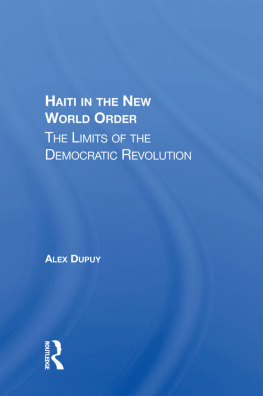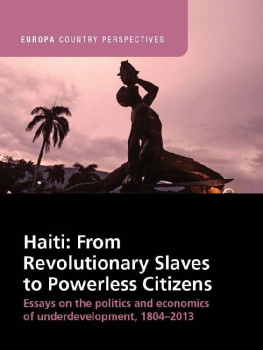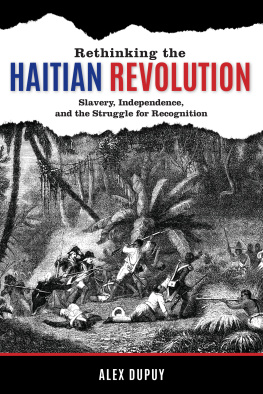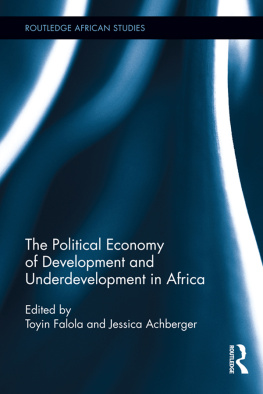Alex Dupuy - Haiti in the World Economy: Class, Race, and Underdevelopment Since 1700
Here you can read online Alex Dupuy - Haiti in the World Economy: Class, Race, and Underdevelopment Since 1700 full text of the book (entire story) in english for free. Download pdf and epub, get meaning, cover and reviews about this ebook. year: 2019, publisher: Routledge, genre: Politics. Description of the work, (preface) as well as reviews are available. Best literature library LitArk.com created for fans of good reading and offers a wide selection of genres:
Romance novel
Science fiction
Adventure
Detective
Science
History
Home and family
Prose
Art
Politics
Computer
Non-fiction
Religion
Business
Children
Humor
Choose a favorite category and find really read worthwhile books. Enjoy immersion in the world of imagination, feel the emotions of the characters or learn something new for yourself, make an fascinating discovery.
- Book:Haiti in the World Economy: Class, Race, and Underdevelopment Since 1700
- Author:
- Publisher:Routledge
- Genre:
- Year:2019
- Rating:4 / 5
- Favourites:Add to favourites
- Your mark:
- 80
- 1
- 2
- 3
- 4
- 5
Haiti in the World Economy: Class, Race, and Underdevelopment Since 1700: summary, description and annotation
We offer to read an annotation, description, summary or preface (depends on what the author of the book "Haiti in the World Economy: Class, Race, and Underdevelopment Since 1700" wrote himself). If you haven't found the necessary information about the book — write in the comments, we will try to find it.
Alex Dupuy: author's other books
Who wrote Haiti in the World Economy: Class, Race, and Underdevelopment Since 1700? Find out the surname, the name of the author of the book and a list of all author's works by series.
Haiti in the World Economy: Class, Race, and Underdevelopment Since 1700 — read online for free the complete book (whole text) full work
Below is the text of the book, divided by pages. System saving the place of the last page read, allows you to conveniently read the book "Haiti in the World Economy: Class, Race, and Underdevelopment Since 1700" online for free, without having to search again every time where you left off. Put a bookmark, and you can go to the page where you finished reading at any time.
Font size:
Interval:
Bookmark:

52 Vanderbilt Avenue, New York, NY 10017
2 Park Square, Milton Park, Abingdon, Oxon OX14 4RN
Product or corporate names may be trademarks or registered trademarks, and are used only for identification and explanation without intent to infringe.
Dupuy, Alex.
Haiti in the world economy : class, race, and underdevelopment since 1700 / Alex Dupuy.
p. cm.(Latin American perspectives series ; no. 4)
Bibliography: p.
Includes index.
ISBN 0-8133-7348-4
1. HaitiEconomic conditions. 2. HaitiSocial conditions. 3. Investments, ForeignHaitiHistory. 4. ExportsHaitiHistory. 5. Social classesHaitiHistory. 6. HaitiRace relations. I. Title. II. Series.
HC153.D86 1989
330.97294dc19
CIP
- ii
Font size:
Interval:
Bookmark:
Similar books «Haiti in the World Economy: Class, Race, and Underdevelopment Since 1700»
Look at similar books to Haiti in the World Economy: Class, Race, and Underdevelopment Since 1700. We have selected literature similar in name and meaning in the hope of providing readers with more options to find new, interesting, not yet read works.
Discussion, reviews of the book Haiti in the World Economy: Class, Race, and Underdevelopment Since 1700 and just readers' own opinions. Leave your comments, write what you think about the work, its meaning or the main characters. Specify what exactly you liked and what you didn't like, and why you think so.












